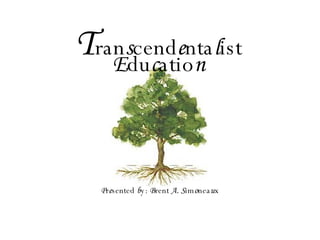Transcendentalist Education Lecture
•Download as PPT, PDF•
4 likes•2,042 views
The document provides an overview of Transcendentalist education presented by Brent A. Simoneaux. It discusses how Transcendentalism was sparked by a philosophical shift from empiricism to intuitionism. It describes the teaching methodology changing from teacher-centered rote learning to student-centered conversation and discussion. It also discusses the learning environment changing from dark poorly lit classrooms to bright colorful rooms filled with books, art, and natural light to inspire creativity.
Report
Share
Report
Share

Recommended
Recommended
Module 3_Historical-Aspect: Contributions-of-Ancient-Philosophers-to-Education

_Historical-Aspect: Contributions-of-Ancient-Philosophers-to-EducationRia Lopez (Reservist)(ms.Education)
More Related Content
What's hot
Module 3_Historical-Aspect: Contributions-of-Ancient-Philosophers-to-Education

_Historical-Aspect: Contributions-of-Ancient-Philosophers-to-EducationRia Lopez (Reservist)(ms.Education)
What's hot (20)
Neo Scholastism, Strenghts & Weaknesses Of Realism

Neo Scholastism, Strenghts & Weaknesses Of Realism
The Impact of Educational Theories on Educational Practice

The Impact of Educational Theories on Educational Practice
253299248 philosophical-and-ideological-foundations-of-education

253299248 philosophical-and-ideological-foundations-of-education
Philosophy Of Realism (Defination And Brief History)

Philosophy Of Realism (Defination And Brief History)
_Historical-Aspect: Contributions-of-Ancient-Philosophers-to-Education

_Historical-Aspect: Contributions-of-Ancient-Philosophers-to-Education
Similar to Transcendentalist Education Lecture
Similar to Transcendentalist Education Lecture (20)
#1 Introduction – How people learn122701EPISODE #1 I.docx

#1 Introduction – How people learn122701EPISODE #1 I.docx
Philosophical school of thought and their impact on education.pptx

Philosophical school of thought and their impact on education.pptx
More from bsimoneaux
More from bsimoneaux (20)
Transcendentalist Education Lecture
- 1. T ran s cend e nta l ist E du c atio n P r e sented b y: B rent A. S im o nea u x
- 2. Movement (noun): “ A series of organized activities working toward an objective; also : an organized effort to promote or attain an end (the civil rights movement ).” Movements Lecture Series
- 3. Movements are often sparked by a shift in philosophical thought. Opening Thoughts
- 4. 1830 - 1850 The Context
- 5. New England Massachusetts The Context
- 6. The literature of Transcendentalism was mostly non-fiction prose and poetry. The Context
- 7. The Context
- 8. The Context 1810 – 1850 Conversations with Women (1840) The Wrongs of American Women (1845) Margaret Fuller
- 9. The Context Amos Bronson Alcott 1799 – 1888 Orphic Sayings (1840) Conversations with Children (1836)
- 10. Elizabeth Peabody 1804 – 1894 Record of a School (1836) Woman (1840) The Context
- 11. The Philosophy Philosophy is an articulation of an understanding of who we are, the way we view the world and ourselves.
- 13. John Locke Knowledge is created through experience. Think: Tabula Rasa The Philosophy
- 14. The Philosophy Immanuel Kant knowledge is created through intuition. Think: Universal Truths
- 15. The Philosophy Intuition “The power or faculty of attaining to direct knowledge or cognition without evident rational thought and inference.”
- 16. The Philosophy So, if Lockean philosophy and the philosophy before Transcendentalism was empirical , known through the senses, then Kantian philosophy is intuitive .
- 17. The Philosophy These two philosophies ask and attempt to answer questions about how we know things, how we learn things .
- 18. The Philosophy What are the implication on education if we shift from a Lockean ( empirical ) to a Kantian ( intuitive ) understanding of how we learn?
- 45. T ran s cend e nta l ist E du c atio n Q ues t ion s
